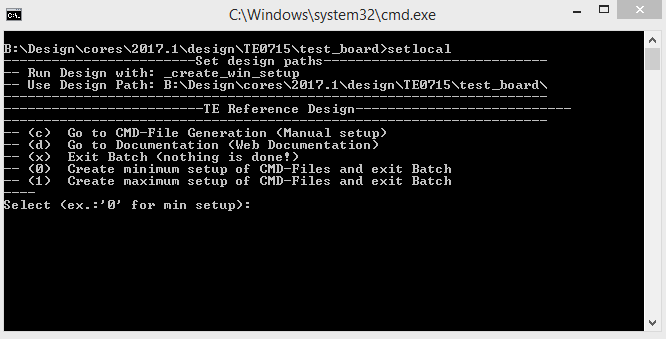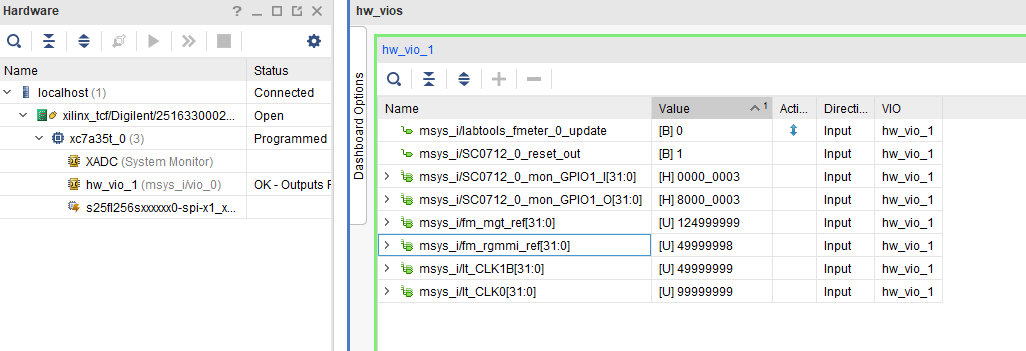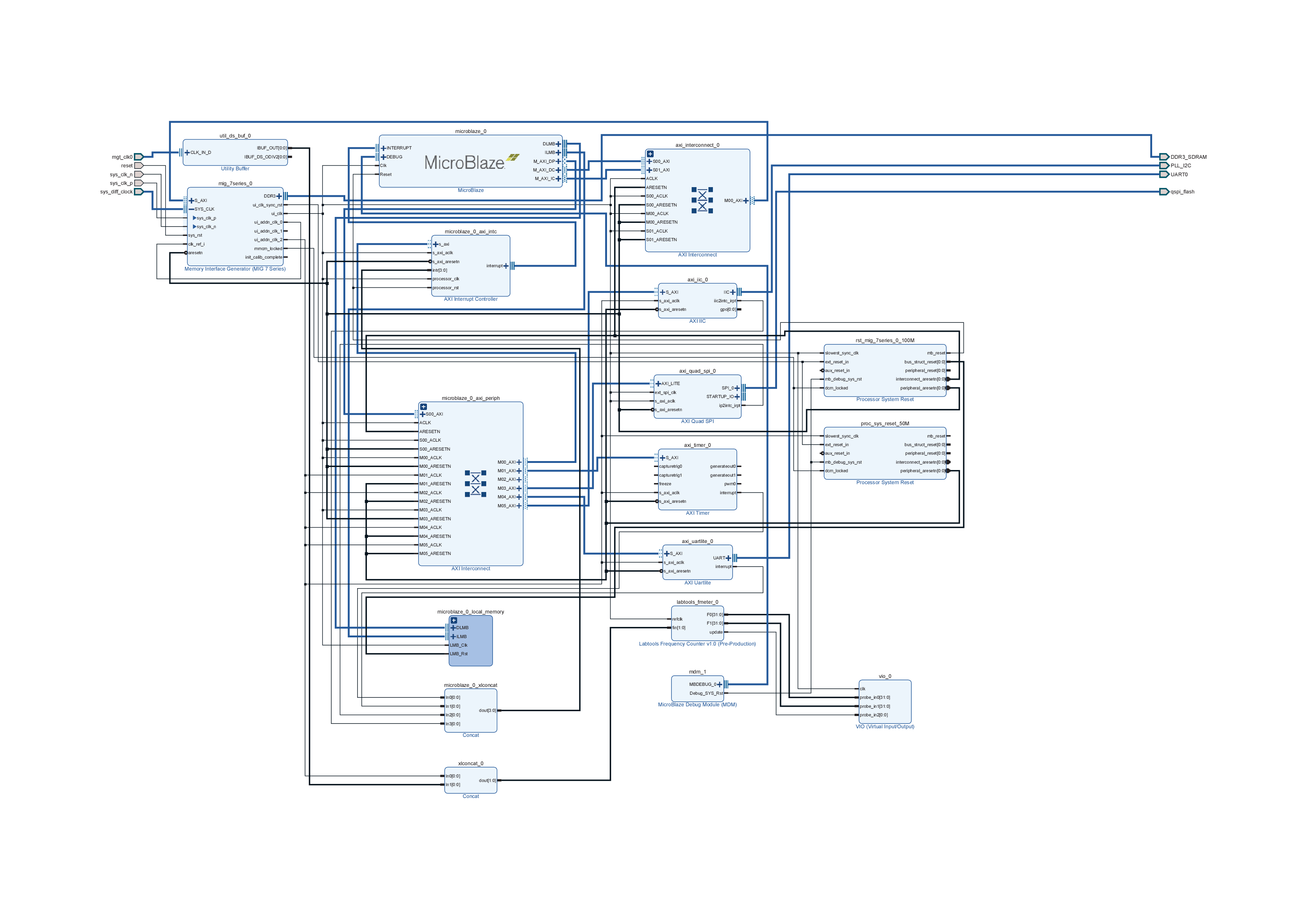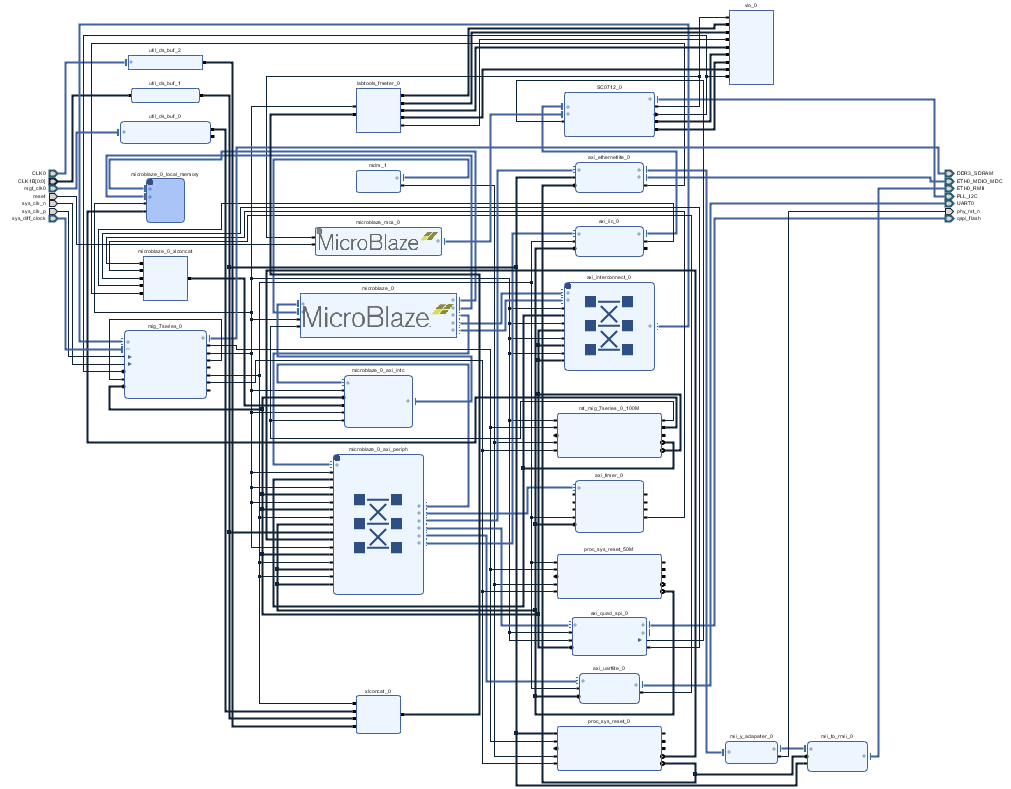Page History
...
| Excerpt |
|---|
|
Revision History
| HTML |
|---|
<!-- - Add changes from design - Export PDF to download, if vivado revision is changed! --> |
...
| Date | Vivado | Project Built | Authors | Description |
|---|---|---|---|---|
| 2017-12-15 | 2017.2 | John Hartfiel |
| |
| 2017-11-07 | 2017.2 | te0712-test_board-vivado_2017.2-build_05_20171107172917.zip te0712-test_board_noprebuilt-vivado_2017.2-build_05_20171107172939.zip | John Hartfiel |
|
| 2017-10-05 | 2017.2 | te0712-test_board-vivado_2017.2-build_03_20171005082148.zip te0712-test_board_noprebuilt-vivado_2017.2-build_03_20171005082225.zip | John Hartfiel |
|
...
| Module Model | Board Part Short Name | PCB Revision Support | DDR | QSPI Flash | Others | Notes | ||||
|---|---|---|---|---|---|---|---|---|---|---|
| te0712-02-35-2i | 35_2i | REV02 | 1GB | 32MB02 | ||||||
| te0712-02-100-1i | 100_1i | REV01, REV02 | 1GB | 32MB01,02 | ||||||
| te0712-02-100-2c |3 | 100_2c | REV01, REV02 | 1GB | 32MB01,02 | ||||||
| te0712-02- | 200100- | 1i|32c3 | 200100_ | 1i 2c | 01REV01, 02 | REV02 | 1GB | 32MB | 2,5 mm connector | |
| te0712-02-200-2i 1i | 200_2i 1i | REV01, REV02 | 1GB | 32MB01,02 | ||||||
te0712-02-200- | 2c|3 1i3 | 200_ | 2c1i | 01REV01, 02REV02 |
Design supports following carriers:
| 1GB | 32MB | 2,5 mm connector | ||||
| te0712-02-200-2i | 200_2i | REV01, REV02 | 1GB | 32MB | ||
| te0712-02-200-2c | 200_2c | REV01, REV02 | 1GB | 32MB | ||
| te0712-02-200-2c3 | 200_2c | REV01, REV02 | 1GB | 32MB | 2,5 mm connector |
Design supports following carriers:
| Carrier Model | Notes |
|---|---|
| TE0701 | |
| TE0703 | used as reference carrier |
| TE0705 | |
| TE0706 | |
| Carrier Model | Notes |
| TE0701 | |
| TE0703 | |
| TE0705 | |
| TE0706 | used as reference carrier |
| TEBA0841 |
Additional HW Requirements:
...
Additional Sources
| Type | Location | Notes |
|---|---|---|
| SI5338 Project | \misc\SI5338 |
Prebuilt
| HTML |
|---|
<!-- <table width="100%"> <tr> <th>File </th> <th>File-Extension</th> <th>Description </th> </tr> <tr> <td>BIF-File </td> <td>*.bif </td> <td>File with description to generate Bin-File </td> </tr> <tr> <td>BIN-File </td> <td>*.bin </td> <td>Flash Configuration File with Boot-Image (Zynq-FPGAs) </td> </tr> <tr> <td>BIT-File </td> <td>*.bit </td> <td>FPGA Configuration File </td> </tr> <tr> <td>DebugProbes-File </td> <td>*.ltx </td> <td>Definition File for Vivado/Vivado Labtools Debugging Interface </td> </tr> <tr> <td>Debian SD-Image </td> <td>*.img </td> <td>Debian Image for SD-Card </td> </tr> <tr> <td>Diverse Reports </td> <td> --- </td> <td>Report files in different formats </td> </tr> <tr> <td>Hardware-Platform-Specification-Files</td> <td>*.hdf </td> <td>Exported Vivado Hardware Specification for SDK/HSI </td> </tr> <tr> <td>LabTools Project-File </td> <td>*.lpr </td> <td>Vivado Labtools Project File </td> </tr> <tr> <td>MCS-File </td> <td>*.mcs </td> <td>Flash Configuration File with Boot-Image (MicroBlaze or FPGA part only) </td> </tr> <tr> <td>MMI-File </td> <td>*.mmi </td> <td>File with BRAM-Location to generate MCS or BIT-File with *.elf content (MicroBlaze only) </td> </tr> <tr> <td>OS-Image </td> <td>*.ub </td> <td>Image with Linux Kernel (On Petalinux optional with Devicetree and RAM-Disk) </td> </tr> <tr> <td>Software-Application-File </td> <td>*.elf </td> <td>Software Application for Zynq or MicroBlaze Processor Systems </td> </tr> <tr> <td>SREC-File </td> <td>*.srec </td> <td>Converted Software Application for MicroBlaze Processor Systems </td> </tr> </table> --> |
...
- _create_win_setup.cmd/_create_linux_setup.sh and follow instructions on shell:
- Press 0 and enter for minimum setup
- (optional Win OS) Generate Virtual Drive or use short directory for the reference design (for example x:\<design name>)
- Create Project
- Select correct device and Xilinx install path on "design_basic_settings.cmd" and create Vivado project with "vivado_create_project_guimode.cmd"
Note: Select correct one, see TE Board Part Files
- Select correct device and Xilinx install path on "design_basic_settings.cmd" and create Vivado project with "vivado_create_project_guimode.cmd"
- Create HDF and export to prebuilt folder
- Run on Vivado TCL: TE::hw_build_design -export_prebuilt
Note: Script generate design and export files into \prebuilt\hardware\<short dir>. Use GUI is the same, except file export to prebuilt folder
- Run on Vivado TCL: TE::hw_build_design -export_prebuilt
- Create Linux (uboot.elf and image.ub) with exported HDF
- HDF is exported to "prebuilt\hardware\<short name>"
Note: HW Export from Vivado GUI create another path as default workspace. - Create Linux images on VM, see PetaLinux KICKstart
- Use TE Template from /os/petalinux
Note: run init_config.sh before you start petalinux config. This will set correct temporary path variable.
Important Note: Select correct Flash partition offset on petalinux-config: Subsystem Auto HW Settings → Flash Settings, FPGA+Boot+bootenv=0x900000 (increase automatically generate Boot partition)
- Use TE Template from /os/petalinux
- HDF is exported to "prebuilt\hardware\<short name>"
- Add Linux Add Linux files (uboot.elf and image.ub) to prebuilt folder
- "prebuilt\os\petalinux\default" or "prebuilt\os\petalinux\<short name>"
Notes: Scripts select "prebuilt\os\petalinux\<short name>", if exist, otherwise "prebuilt\os\petalinux\default"
- "prebuilt\os\petalinux\default" or "prebuilt\os\petalinux\<short name>"
- Generate UBoot SREC:
- Create SDK Project with TE Scripts on Vivado TCL: TE::sw_run_sdk
- Create "uboot-dummy" application
Note: Use Hello World Example - Copy u.boot.elf into "\workspace\sdk\uboot-dummy\Debug"
- Open "uboot-dummy" properties → C/C++ Build → Settings and go into Build Steps Tap.
- Add to Post-build steps: mb-objcopy -O srec u-boot.elf u-boot.srec
- Press Apply or regenerate project
Note: srec is generated on "\workspace\sdk\uboot-dummy\Debug\u-boot.srec"
- Generate Programming Files with HSI/SDK
MCS Firmware (optional):- Create SDK Project with TE Scripts Run on Vivado TCL: TE::sw_run_hsisdk
- Create "SCU" application
Note: Select MCS Microblaze and SCU Application - Select Release Built
- Regenerate App
- Generate Programming Files with HSI/SDK
- Run on Vivado TCL: TE::sw_run_hsi
Note: Scripts generate applications and bootable files, Scripts generate applications and bootable files, which are defined in "sw_lib\apps_list.csv" - (alternative) Start SDK with Vivado GUI or start with TE Scripts on Vivado TCL: TE::sw_run_sdk
Note: See SDK Projects
- Run on Vivado TCL: TE::sw_run_hsi
- Copy "\prebuilt\software\<short name>\srec_spi_bootloader.elf" into "\firmware\microblaze_0\"
- (optional) Copy "\\workspace\sdk\scu\Release\scu.elf" into "\firmware\microblaze_mcs_0\"
- Regenerate Vivado Project or Update Bitfile only with "srec_spi_bootloader.elf" and "scu.elf"
Launch
Programming
| HTML |
|---|
<!-- Description of Block Design, Constrains... BD Pictures from Export... --> |
...
- Prepare HW like described on section Programming
- Connect UART USB (most cases same as JTAG)
- Power on PCB
Note: FPGA Loads Bitfile from Flash,MCS Firmware configure SI5338 and starts Microblaze, SREC Bootloader from Bitfile Firmware loads U-Boot into DDR (This takes a while), U-boot loads Linux from SD QSPI Flash into DDR
Boot process takes a while, please wait.
...
- Open Serial Console (e.g. putty)
- Speed: 9600
- COM Port: Win OS, see device manager, Linux OS see dmesg |grep tty (UART is *USB1)
- Linux Console:
Note: Wait until Linux boot finished For Linux Login use:- User Name: root
- Password: root
...
- You can use Linux shell now.
- ETH0 works with udhcpc
- ETH0 works with udhcpc
Vivado HW Manager:
- Open Vivado HW-Manager and add VIO signal to dashboard (*.ltx located on prebuilt folder).
- Set radix from VIO signals (MGT REF, MIG_OUT, CLK1B, CLK0) to unsigned integer.
Note: Frequency Counter is inaccurate and displayed unit is Hz - MGT REF~125MHz, MIG_50MHZ~50MHz., CLK1B ~50MHz, CLK0~100MHz
- Additional Infos: System reset from MCS and GIO outputs
- Set radix from VIO signals (MGT REF, MIG_OUT, CLK1B, CLK0) to unsigned integer.
CLK is configured to 125MHz by default, second MIG output CLK is 50MHz.
System Design - Vivado
| HTML |
|---|
<!-- Description of Block Design, Constrains... BD Pictures from Export... --> |
Block Design
Constrains
Basic module constrains
...
| Code Block | ||||||||
|---|---|---|---|---|---|---|---|---|
| ||||||||
set_property PULLDOWN true [get_ports reset] |
Software Design - SDK/HSI
| HTML |
|---|
<!--
optional chapter
separate sections for different apps
--> |
For SDK project creation, follow instructions from:
Application
SREC SPI BootLoader
Add some Console outputs and changed Bootloader Read Address.
Template location: \sw_lib\sw_apps
xilisf_v5_8
Changed default Flash Typ to 5.
Template location: \sw_lib\sw_services
U-Boot
U-Boot.elf is generated with PetaLinux. SDK/HSI is used to generate u-boot.srec. Vivado to generate *.mcs
Software Design - PetaLinux
| HTML |
|---|
<!--
optional chapter
--> |
Description currently not available.
Config
- Set kernel flash Address to 0x900000 and Kernel size to 0xA00000:
(--> Subsystem Auto Hardware Settings --> Flash Settings)- SUBSYSTEM_FLASH_AXI_QUAD_SPI_0_BANKLESS_PART0_SIZE = 0x400000
- SUBSYSTEM_FLASH_AXI_QUAD_SPI_0_BANKLESS_PART1_SIZE = 0x4E0000
- SUBSYSTEM_FLASH_AXI_QUAD_SPI_0_BANKLESS_PART2_SIZE = 0x20000
- SUBSYSTEM_FLASH_AXI_QUAD_SPI_0_BANKLESS_PART3_SIZE = 0xA00000
U-Boot
No changes.
Device Tree
No changes.
| Code Block | ||||||||
|---|---|---|---|---|---|---|---|---|
| ||||||||
#I2C
set_property PACKAGE_PIN W21 [get_ports pll_i2c_scl_io]
set_property IOSTANDARD LVCMOS33 [get_ports pll_i2c_scl_io]
set_property PACKAGE_PIN T20 [get_ports pll_i2c_sda_io]
set_property IOSTANDARD LVCMOS33 [get_ports pll_i2c_sda_io]
#Reset
set_property PACKAGE_PIN T3 [get_ports reset]
set_property IOSTANDARD LVCMOS15 [get_ports reset]
#CLKS
set_property PACKAGE_PIN R4 [get_ports {CLK1B[0]}]
set_property IOSTANDARD SSTL15 [get_ports {CLK1B[0]}]
set_property PACKAGE_PIN K4 [get_ports {CLK0_clk_p[0]}]
set_property IOSTANDARD DIFF_SSTL15 [get_ports {CLK0_clk_p[0]}]
#ETH PHY
set_property PACKAGE_PIN N17 [get_ports phy_rst_n]
set_property IOSTANDARD LVCMOS33 [get_ports phy_rst_n] |
| Code Block | ||||||||
|---|---|---|---|---|---|---|---|---|
| ||||||||
create_clock -period 8.000 -name mgt_clk0_clk_p -waveform {0.000 4.000} [get_ports mgt_clk0_clk_p]
create_clock -period 10.000 -name {CLK0_clk_p[0]} -waveform {0.000 5.000} [get_ports {CLK0_clk_p[0]}]
create_clock -period 20.000 -name {CLK1B[0]} -waveform {0.000 10.000} [get_ports {CLK1B[0]}]
create_clock -period 15.152 -name msys_i/axi_quad_spi_0/U0/NO_DUAL_QUAD_MODE.QSPI_NORMAL/QSPI_LEGACY_MD_GEN.QSPI_CORE_INTERFACE_I/LOGIC_FOR_MD_12_GEN.SCK_MISO_STARTUP_USED.QSPI_STARTUP_BLOCK_I/cfgmclk -waveform {0.000 7.576} [get_pins msys_i/axi_quad_spi_0/U0/NO_DUAL_QUAD_MODE.QSPI_NORMAL/QSPI_LEGACY_MD_GEN.QSPI_CORE_INTERFACE_I/LOGIC_FOR_MD_12_GEN.SCK_MISO_STARTUP_USED.QSPI_STARTUP_BLOCK_I/STARTUP_7SERIES_GEN.STARTUP2_7SERIES_inst/CFGMCLK]
set_false_path -from [get_clocks {CLK0_clk_p[0]}] -to [get_clocks clk_pll_i]
set_false_path -from [get_clocks mgt_clk0_clk_p] -to [get_clocks clk_pll_i]
set_false_path -from [get_clocks msys_i/axi_quad_spi_0/U0/NO_DUAL_QUAD_MODE.QSPI_NORMAL/QSPI_LEGACY_MD_GEN.QSPI_CORE_INTERFACE_I/LOGIC_FOR_MD_12_GEN.SCK_MISO_STARTUP_USED.QSPI_STARTUP_BLOCK_I/cfgmclk] -to [get_clocks clk_pll_i]
set_false_path -from [get_clocks -of_objects [get_pins msys_i/mig_7series_0/u_msys_mig_7series_0_0_mig/u_ddr3_infrastructure/gen_ui_extra_clocks.mmcm_i/CLKFBOUT]] -to [get_clocks mgt_clk0_clk_p]
set_false_path -from [get_pins msys_i/labtools_fmeter_0/U0/COUNTER_REFCLK_inst/bl.DSP48E_2/CLK] -to [get_pins {msys_i/vio_0/inst/PROBE_IN_INST/probe_in_reg_reg[*]/D}]
set_false_path -from [get_pins {msys_i/labtools_fmeter_0/U0/F_reg[*]/C}] -to [get_pins {msys_i/vio_0/inst/PROBE_IN_INST/probe_in_reg_reg[*]/D} |
Software Design - SDK/HSI
| HTML |
|---|
<!--
optional chapter
separate sections for different apps
--> |
For SDK project creation, follow instructions from:
Application
SCU
MCS Firmware to configure SI5338 and Reset System.
SREC SPI BootLoader
Add some Console outputs and changed Bootloader Read Address.
Template location: \sw_lib\sw_apps
xilisf_v5_8
Changed default Flash Typ to 5.
Template location: \sw_lib\sw_services
U-Boot
U-Boot.elf is generated with PetaLinux. SDK/HSI is used to generate u-boot.srec. Vivado to generate *.mcs
Software Design - PetaLinux
| HTML |
|---|
<!--
optional chapter
--> |
Description currently not available.
Config
- Set kernel flash Address to 0x900000 and Kernel size to 0xA00000:
(--> Subsystem Auto Hardware Settings --> Flash Settings)- SUBSYSTEM_FLASH_AXI_QUAD_SPI_0_BANKLESS_PART0_SIZE = 0x400000
- SUBSYSTEM_FLASH_AXI_QUAD_SPI_0_BANKLESS_PART1_SIZE = 0x4E0000
- SUBSYSTEM_FLASH_AXI_QUAD_SPI_0_BANKLESS_PART2_SIZE = 0x20000
- SUBSYSTEM_FLASH_AXI_QUAD_SPI_0_BANKLESS_PART3_SIZE = 0xA00000
U-Boot
| Code Block | ||
|---|---|---|
| ||
#include <configs/platform-auto.h>
#undef CONFIG_PHY_XILINX
#undef XILINX_EMACLITE_BASEADDR 0x40E00000
#undef CONFIG_MII
#undef CONFIG_PHY_GIGE
#undef CONFIG_PHY_MARVELL
#undef CONFIG_PHY_NATSEMI
#undef CONFIG_NET_MULTI
#undef CONFIG_BOOTP_MAY_FAIL
#undef CONFIG_NETCONSOLE 1
#undef CONFIG_SERVERIP 192.168.150.117
#undef CONFIG_IPADDR
/* PREBOOT */
#define CONFIG_PREBOOT "echo U-BOOT for petalinux;setenv preboot; echo; "
|
Device Tree
| Code Block | ||
|---|---|---|
| ||
/include/ "system-conf.dtsi"
/ {
};
/* ETH PHY */
&axi_ethernetlite_0 {
phy-handle = <&phy0>;
mdio {
#address-cells = <1>;
#size-cells = <0>;
phy0: phy@0 {
device_type = "ethernet-phy";
reg = <1>;
};
}; | ||
| Code Block | ||
| ||
/include/ "system-conf.dtsi"
/ {
};
|
Kernel
No changes.
Rootfs
...
| Date | Document Revision | Authors | Description | ||||||||||||||||||||||
|---|---|---|---|---|---|---|---|---|---|---|---|---|---|---|---|---|---|---|---|---|---|---|---|---|---|
|
|
|
| ||||||||||||||||||||||
| 2017-11-07 | v.11 | John Hartfiel |
| ||||||||||||||||||||||
| 2017-10-06 | v.10 | John Hartfiel |
| ||||||||||||||||||||||
| 2017-10-05 | v.8 | John Hartfiel |
| ||||||||||||||||||||||
| 2017-09-11 | v.1 |
|
| ||||||||||||||||||||||
| All |
|
...




